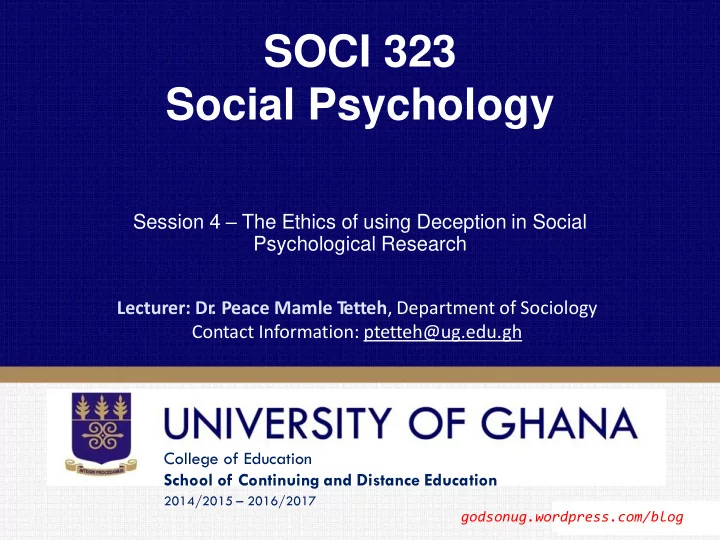

SOCI 323 Social Psychology Session 4 – The Ethics of using Deception in Social Psychological Research Lecturer: Dr . Peace Mamle T etteh , Department of Sociology Contact Information: ptetteh@ug.edu.gh College of Education School of Continuing and Distance Education 2014/2015 – 2016/2017 godsonug.wordpress.com/blog
Session Overview • Deception is one of the common techniques used in Social Psychological research. In this session we shall explain what deception is and how it is used. We shall explore the factors that would necessitate the use of deception and the implications of its use. We shall identify the strategies that may be used to mitigate the ethical dilemmas associated with the use of deception in Social Psychological research. • At the end of the session, the student will understand what deception in Social Psychological research is and how it is employed be able to mention the various implications of the use of deception for the research participants, the research process and outcomes and for future researches. be able to identify the strategies that can be employed to mitigate the effects of the use of deception Slide 2
Session Outline The key topics to be covered in the session are as follows: • What is Deception? • How is Deception is used in Social Psychological Research? • Ethical issues with the use of Deception. • Mitigating the implications of Deception. Slide 3
Reading List • Read chapter one of the recommended text and the article on this session posted on Sakai. Slide 4
T opic One DEFINING DECEPTION Slide 5
What is Deception? • Deception is a technique where researchers withhold or conceal information about the purposes or procedures of a study from persons participating in it. • In other words deception is misleading participants about the true purpose of a study or the events that will actually occur. • Deception is used in situations in which information about such matters might be expected to change the suďjeĐt’s behaviour, thus invalidating the results of the research. Slide 6
How Deception is used Deception is done: i. by omission of key information about an ii. experiment, provision of false or misleading information, iii. using confederates or accomplices i.e. people working with the researcher who pretend to be participants. Slide 7
Ethical Issues with using Deception Deception raises many ethical challenges which include: • the fact the participants misled may resent being deceived. • some people may develop negative attitudes towards Social Psychological research or research in general when they find out they have been deceived by a researcher • The evidence that to some degree, some persons may even become suspicious of information from researchers, which is a real challenge for the future of this discipline. • The fact that some participants may experience some discomfort (stress, anger, shifts in self esteem etc). This may be the case in situations where people have been exposed to others in situations that seemed like emergencies, or a seizure (Latane & Darley 1968) • Now the question is, is it right to put people through these just for the sake of research? Is it all right to invade people’s privacy to conduct a research? Slide 8
When to use Deception • There are some benefits from using deception in Social Psychological research. • However there is a need to control the effects of deception used in a research because of the several ethical questions and debates that surround its use. • First you must use deception only where it is absolutely necessary and only where there is no other means of obtaining the information you need. • Secondly, you must be extremely careful to ensure that the rights, safety and wellbeing of participants are protected. This is done by using the safeguards of informed consent and debriefing. Slide 9
Safeguard 1- Informed Consent • Informed consent refers to a procedure in which research participants are provided with as much information as possible about a research project before deciding whether to participate in it (Baron et al, 2006). • Aronson et al explain it to be an agreement to participate in an experiment granted in full awareness of the nature of the experiment, which has been explained in advance. • Thus, prior to partiĐipants’ decision to take part in a research; they are given a full description of the procedures to be followed. Thus, they know what they are getting into. Slide 10
Safeguard 2- De-briefing • This is done at the end of a research. It is a procedure in which participants are given full information about the nature of the research and the hypotheses under investigation. • Participants are made aware of the true purpose of the study and why particular approaches or procedure were used are explained. • All questions that participants may have are answered and negative reactions are dealt with so that at least, participants leave as they came. Slide 11
Sample Question • Identify any Social Psychological research topic which can only be studied only with the use of deception. Which of the safeguards would be most appropriate to use in this instance and why? Slide 12
References • Robert, B. and Branscombe, N. (2012). Social Psychology. 13 th Edition. Pearson Education, Inc. • Aronson, E., Wilson, T. & Akert, R. (2007) Social Psychology. 6 th Edition. Pearson Education Inc. • Aronson, E., Wilson, T. & Akert, R. (2010) Social Psychology. 7 th Edition. Pearson Education Inc. Slide 13
Recommend
More recommend